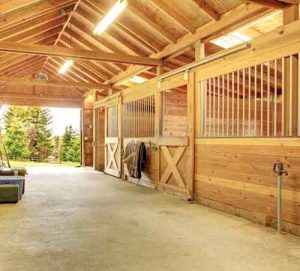Time-Challenged Equestrians at the Barn


We’ve all got to-do lists, dirty dishes in our sinks, loads of laundry to do, unwashed cars, errands to run and groceries to get. Each and every one of us have 168 hours in a week to manage everything in our time-consuming lives. Our basic survival tasks alone can drain our time and energy banks, making life difficult. Add family drama and schedules, work commitments and stress, friends and relationship highs and lows, and the time time-challenged equestrians have left—if any—is ours to use in the most meaningful, efficient way possible.


Develop a Routine
As equestrians, we should know how to stay on top of things, but sometimes we find ourselves stranded at the mounting block with not enough time to ride. Our horses don’t understand why our time for them is inconsiderately interrupted or pushed aside.
Our bond with our horse is built on patience and trust and in providing proper care. We either nurture the bond with time and consistency or deplete its value with a lack of effort and rushed care-taking. Being pulled into different directions can weigh on riders.
To combat this, set up some time rules to follow once you finally make it to the barn. Developing a routine and sticking to it will help keep you in control. Then you can make fast work out of the most time-consuming tasks and avoid wasteful steps and distractions. Here are some tips for when you’re short on time.
◆ Be polite to Chatty Cathy barn buddies and explain you only have a short time to ride. Suggest a coffee date to catch up instead of spending precious barn time chatting.
◆ To keep the pace and not get stuck on certain jobs, set an alarm on your cell phone to indicate when you should be done grooming and tacking up.
◆ Keep all your tack and grooming supplies organized. Having spares of easily lost items like scissors, hoof picks and duct tape will cut down on time lost searching for items.
◆ Faithfully return items to their rightful place every time you use them.
◆ Clean your tack—but not after every single ride. A simple wipe-down will suffice until you have the time to properly clean it.
◆ Make sure to wet and clean your horse’s bit every time you use it. You’ll end up having to spend more time soaking and scrubbing dried and caked-on food particles than if you rinse right away.
◆ If it’s cool enough, put a sheet or blanket on your horse to help him stay cleaner and reduce grooming time. Make sure it fits well and all the leg straps and buckles are safely adjusted.
◆ Invest in the right tools needed for the job. A heavy metal pitchfork and plastic muck tub aren’t going to make stall cleaning easier or faster. Lightweight but sturdy manure forks and an oversized wheelbarrow are the best for this job.
◆ Only start a task if you have enough time to finish it completely. When cleaning a sheath, treating fungus or thrush, disinfecting a wound, or giving a bath, it’s best to give yourself ample time. Leaving jobs like this halfway finished isn’t the healthiest for your horse.
Beware of Skipping on Training
No horse lover wants to cut back on their time in the saddle riding and training their horse. Time constrictions usually force new techniques or skip significant steps with our horses and end up damaging the training process. It may feel like you’re getting ahead in the short term, but in reality you aren’t doing yourself or your horse any favors.
When you hit a wall and the learning stops, the time you thought you saved by rushing through some basic set-up steps will leave holes in your horse’s training, and you’ll have to go back and fill in those holes with the experience that was left out. You may need a professional trainer to step in, which can become very costly.
It’s better to actively teach your horse in 15-20 minutes (after warming up) than to drill on things for an hour. A shorter ride or exercise time makes it easier for your horse to stay engaged. Reviewing the basics in more time-condensed rides serves as a good reset and refreshes foundational skills. Save the introduction of any new skills for when you have more time and patience to start things off right.
Never end your ride frustrated or on the defensive. It will create negative experiences and reinforce bad habits for both you and your horse. It’s not important to win every single battle, and compromising can turn any training situation into a more neutral situation.
Focus on riding from a position of positive rewards to make sure you’re always making progress towards the final goal of becoming a happy, successful horse-and-rider team.
Time-Challenged Equestrians Get Help
When time is lacking, take advantage of quick barn visits and work smarter. You may need to stay flexible when it comes to your horse’s ever-changing needs. In spite of our best intentions, very few of us are able to handle everything that our horses need without help from others. It’s a huge relief to have someone you trust to be able to step in and give your horse attention and care when you can’t make it to the barn.
If you’re at a boarding facility, finding someone to lend a hand should be fairly easy and affordable. Barn employees, trainers and even capable older lesson students can ease your workload. Trading responsibilities and taking turns with chores and other barn duties with others can be the answer to time-related problems for your horse’s daily regimen.
If you’re at a boarding facility, finding someone to lend a hand should be fairly easy and affordable. Barn employees, trainers and even capable older lesson students can ease your workload.
How can you split up grooming, longeing, blanketing, and medical treatments? Put your heads together to create a barn calendar that covers everyone’s schedules, vacations and emergencies that seem to come up last minute.
Leasing Your Horse
If your daily routine is still a struggle and unmanageable, you may consider leasing out your horse. A simple contract can be drafted to set up guidelines for a full or partial lease, offering the shared privilege of riding and caring for your horse.
Leases can have time- and money-saving benefits for you, and in return you’re giving someone the experience of horse ownership, without all the risks. This is a win-win situation if all parties agree to the rules and terms of the lease. Every lease should come with a breakdown of responsibilities with clear expectations for everyone involved, including the price of the lease; bills from veterinarians, farriers and trainers; riding availability; off-site usage; and other liabilities.
Barn and horse time should always feel rewarding, and if you are one of the time-challenged equestrians and aren’t enjoying every dirty and dusty minute with your horse, then it may be time for you to take a step back and look at your priorities. Overworking ourselves, spreading ourselves too thin and pleasing other people needs to be replaced with delegating, asking for help, and putting things on the back burner until there is sufficient time.
Ryan Blair, an American author and entrepreneur once said, “If you want something bad enough, you will find a way; if you don’t, you’ll find an excuse.”
If your horse time is of the essence, you’ll find a way to make that time.
This article on time-challenged equestrians appeared in the January 2020 issue of Horse Illustrated magazine. Click here to subscribe!
Recent Posts
How to Clean a Horse’s Sheath
If you’ve never cleaned a horse’s sheath, you probably have questions. First and foremost, is it really necessary? And more…
All Three Equestrian Sports Receive Final Confirmation for the LA 2028 Olympic Games
After a nail-biting two years of speculation about the inclusion of equestrian sports in the next Olympic Games, it was…
ASPCA Right Horse Adoptable Horse of the Week: Xanthus
Welcome to Horse Illustrated’s weekly installment of the Right Horse Adoptable Horse of the Week, offered in partnership with the…
Be Your Horse’s Joint Health Champion
Equine arthritis can affect horses of all disciplines and ages, and early intervention is crucial for maintaining comfort and performance.…
Tamie Smith: Taking It To The Next Level
Mother, grandmother, and winning 5* eventing rider—these three titles don’t typically go together. However, Tamie Smith, 49, is all of…
Organize & Customize Your Horse Trailer Storage
Organize and customizer your new horse trailer by adding a few simple storage items. I’ve been on the search for…